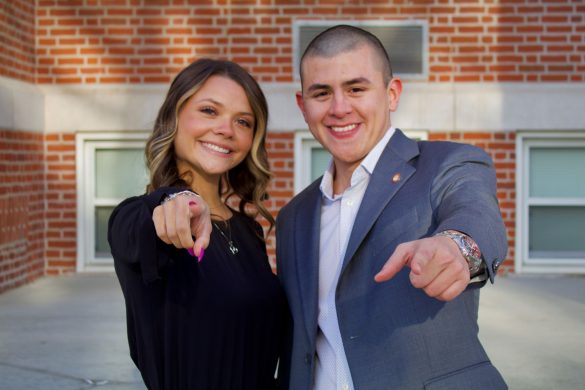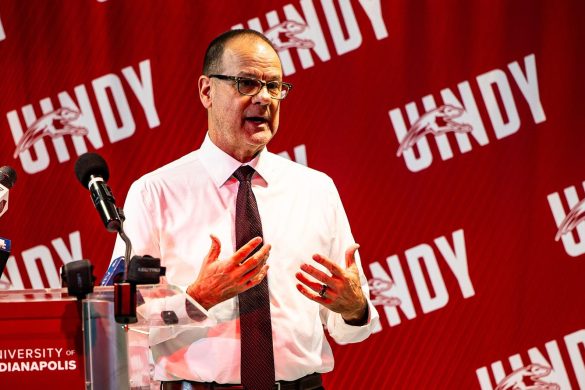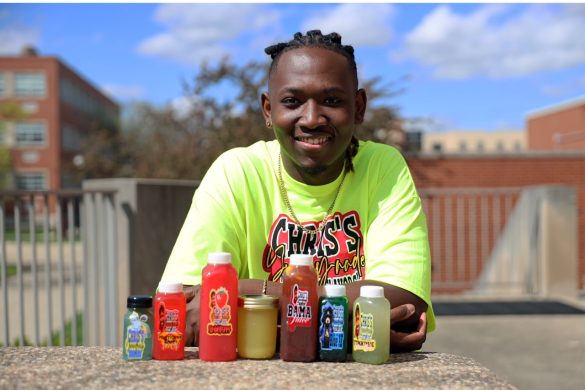February holds different connotations to different people. For some it may be just another month on the calendar, for others it is a time to celebrate heritage and learning. On campus and within the University of Indianapolis community, students and staff have opened up about their feelings towards Black History Month.
Amber Smith talks diversity and importance of BHM
In 2014, before she was hired at UIndy, Vice President and Chief Inclusion and Equity Officer Amber Smith said she took a group of University of Arkansas at Little Rock students on a trip around Spain and Morocco. In Morocco, the group had planned to stop at an orphanage, play with the kids and teach them about art and music. Smith said when the group had to leave a few hours later, many students were in tears. Those moments where they experienced the company of those children were the most impactful part of the entire trip.
The focus this month is turned to that of coming together to celebrate America’s history, Smith said, because black history is American history, it is just not as well documented as the other. No matter how one celebrates Black History Month, Smith said, there is no wrong way to do it, as long as “the spirit in the space is of honor and reverence.”
The amount of money or days on the calendar does not negate what the celebration means, because like in her 2014 trip, the things that mean the most cost nothing, Smith said. The conversations or events that take place this month can mean so much to people, and that does not have to cost anything.
“We stand on the backs of greatness and many of these opportunities that we have would not have been realized had people not come before us,” Smith said. “I think Black History Month is a time to remember, reflect and honor those with such an important legacy.”
For Smith, Black History Month is about recognizing that figures in the history books are not the only ones to be remembered and thankful for during Black History Month. Smith said black history is her great-grandmother. She said she put a quilt together for Smith before she was born so she could be wrapped in it. Even the history of quilt making dates back to the time of the Underground Railroad, Smith said, where quilts and blankets were hung in windows to “dry” when in reality they were used as a sign of direction to those traveling to safety.
While this is her first Black History Month at the UIndy, before her hire Smith had held an interactive event during February called the Overground Railroad at her previous occupation. It was an exploration of black history from the African kingdoms, to the capturing of slaves to Jim Crow laws and finally Obama’s inauguration, according to Smith. She said while she was not part of the planning for this year’s events, Smith hopes to plan something similar in the future.
“I think there’s something to having audiences move through [history], they enjoy that,” Smith said.
Smith said that celebrating black history should not be limited to just one month, but months like Black History, Hispanic Heritage and Women’s History Month are times to say thank you to the people who have made strides for the sake of others. Smith said that this month is a great time to discuss these topics, even though they can be had throughout the entire year.
Black Student Association and campus celebrations
For sophomore social work major and secretary of the Black Student Association Tylyn Johnson, this month makes for an important time to have conversations about race and the world’s history with it.
“I like the social structures of [Black History Month] … but [also] how we’ve separated people and how that’s influenced our history. Because I feel like most of the year we don’t talk about it, or if we do, it’s very fight or flight as opposed to celebratory,” Johnson said.
The world has benefited greatly from black history, so this month should be important to all, Johnson said. They have influenced modern technology by kickstarting the industrialization of the world from farms and even vogue fashion culture, Johnson said, as it was Latinos and black people who started that type of fashion.
With BSA’s events, Johnson said he hopes that people who come to them will take away a sense of community and respect for history, including the past, present and future of the history that people are making. Out of all the events, Johnson said that the Legacy of Excellence dinner, which is being held on Feb. 19, is probably the most important.
“[The dinner] is a huge reflection as a community about this in a way that’s much more broad and very ceremonial in a way,” Johnson said.
The ceremonial aspect, according to Johnson, comes from the formal attire, listening to the speakers and the atmosphere of the event. Johnson said that this ceremony is a school tradition. It is not only special because it is a tradition, it is also symbolic for the black community, Johnson said.
The Legacy of Excellence dinner is supposed to shed light on the black faculty and students who are making moves and strides on campus, sophomore communication major and vice president of BSA Lauren Wright said. Another event she said she likes is the Trivia Night because it is very educational for everyone involved.
“I really like [the trivia] because it’s really a part of the learning we kind of lack in schools,” Wright said. “Growing up I didn’t really learn too much in textbooks about black heroes and so doing this trivia gives us some insight on some of those things that we would have never imagined.”
“Hidden Figures” the movie tells the story of Katherine Johnson and her work behind the scenes at NASA for helping put the first man on the moon. Wright said Katherine has been a figure that she has always admired because she went years without her work being noticed and she never pushed an agenda of being seen. Katherine carried herself like a true queen would, Wright said.
“I think she inspired me to pave my own path… but I think seeing the dynamic and different range of black women can do, I learned that from her,” Wright said. “Because black women are not just homemakers…. We can do anything.”
For Johnson, the black women around him, whether that be his family, friends, professors or supervisors, have talked highly of him. According to Johnson they have all said he was something special, that he can do something they just have to put effort into helping him. Johnson said this inspiration and backing helps him become a better version of himself.
“It really cements for me my passion for social justice issues and wanting to be an advocate for people because I feel like I’ve had a lot of people advocate for me,” Johnson said. “But not everybody has those people so to honor that support, I want to make sure other people can get support in some kind of way.”
Constantly pushing to better versions of themselves, Wright, Johnson and Smith said they think UIndy does a good job at celebrating Black History Month, but there could always be room for improvement for it as well.
Johnson said he feels safe on campus to express who he is all times of the year, but there are times when he feels he needs to calm down on vocalizing, using certain dialects or discussing black history. If the university was able to spread the black history appreciation throughout the year, he said that would be beautiful and would help a lot of students of color not feel isolated on a predominantly white campus. According to Johnson, a longer celebration would be fine to him, as long it would not turn into tokenizing black culture.
For minorities all over campus, Wright said that UIndy could do more to celebrate all of them, not just during their respective months. Wright said she is “black 365 days of the year” and she thinks that others should stand boldly in their blackness throughout the year as well.
“[Being bold] is what is going to bring attention and really encourage people to want to know better and be better and really honoring our blackness,” Wright said. “I think that if we do that all year around, our voices will be heard.”
Carter Woodson: The Father of Black History Month
After starting the tradition of celebrating black history in 1926, Dr. Carter G. Woodson has been known as the father of Black History Month. According to the Dr. Carter G. Woodson African American Museum’s website, the black history celebration started as the second week of February in honor of Abraham Lincoln and Frederick Douglass’ birthdays, and was originally known as “Negro History Week.” According to the museum’s website, Woodson began spreading awareness of black history when he formed the Association for the Study of Negro Life and History in 1912, which has since been changed to the Association for the Study of African American Life and History. Woodson’s vision for Negro History Week according to ASALH was, “The study of more than two great men (Douglass and Lincoln) but the study of a great race.”
Overtime, the push for public knowledge of black history began making its way into public schools during the 1940s, according to ASALH. Teachers secretly brought it into the classroom as a part of the curriculum. The ASALH website reads that as a part of the civil rights movement, this eventually led to black history being incorporated into classes out of secrecy.
Since its origin, the 1960s are known by the general public as the biggest decade for the civil rights movement. Various events that occurred in the 1960s include the Greensboro Sit-ins, protests across the southern states, the March on Washington for Jobs and Freedom, Martin Luther King Jr’s “I Have a Dream’’ Speech and the first appointed African American Supreme Court judge Thurgood Marshall, according to NPR’s Black History Month Timeline.
With much of this occurring in 1963, it led to the biggest part of the civil rights movement, the Civil Rights Act of 1964, according to the National Park Service’s website. The act ended segregation in public places, banned employment discrimination and discrimination in all parts of daily American life, according to the NPS website. The civil rights movement during the 1960s brought with it the assassination of Martin Luther King Jr. in Memphis, Tennessee in 1968. In solidarity for King Jr.’s assassination, the NPS website states that there was rioting in 125 cities across the United States.
Today, the 2020 Black History Month theme, set by the ASALH, is “African Americans and the Vote.” Black History Month observers are also celebrating the 150th anniversary of the 15th Amendment being ratified, giving men of all races the right to vote. It is also the 100th anniversary of the 19th Amendment, which gave women the same undeniable right to vote.








